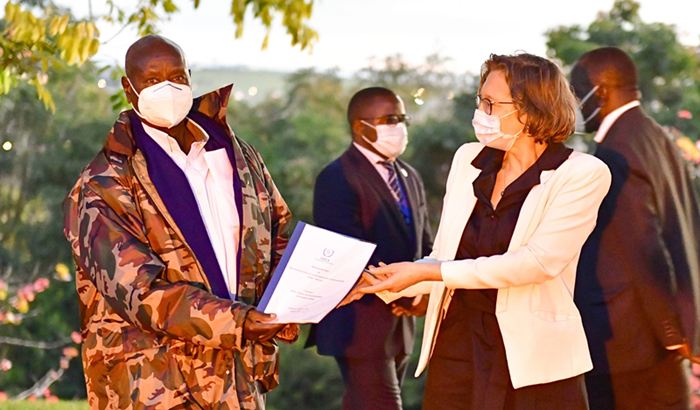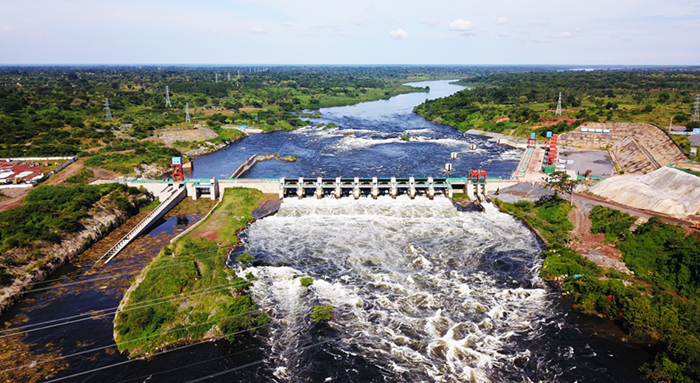|
||||||||||
| Home Nation World Business Opinion Lifestyle ChinAfrica Multimedia Columnists Documents Special Reports |
|
||||||||||
| Home Nation World Business Opinion Lifestyle ChinAfrica Multimedia Columnists Documents Special Reports |
| ChinAfrica |
| Uganda to Go Nuclear |
| The IAEA approves Uganda’s bid to construct a nuclear power plant |
| Reporting from Uganda Godfrey Olukya 丨VOL. 14 August 2022 ·2022-08-19 |

An IAEA report on nuclear power infrastructure is presented to Uganda (IAEA)
The first nuclear power plant in East and Central Africa, to be built in Uganda, has been given the go-ahead by the International Atomic Energy Agency (IAEA) on May 10.
The approval, according to Uganda’s Minister of Energy and Mineral Development Ruth Nankabirwa, was made by the IAEA after a team of experts concluded an eight-day mission to the country to review its infrastructure development for a nuclear power program. Nankabirwa said the review was carried out at the request of the Government of Uganda.
A statement from Uganda’s State House said the IAEA’s Director in Charge of Nuclear Power for Africa Aline des Cloizeaux met President Yoweri Museveni and informed him of the approval.
“We have concluded that Uganda is ready for the plant. We in the agency are ready for all the support through training so that the project becomes a reality,” said des Cloizeaux.
Museveni appreciated the IAEA approval. “We need the nuclear power plant because hydro power will soon not be enough for the country. We came up with the idea to put in place the nuclear power plant as one of the ways to solve the power shortage in the country,” he said.
In 2017, while addressing the nation, Museveni said, “We are going to solve the power shortage by constructing a nuclear power plant. We plan to build a 2,000-mw power plant.”
Why nuclear power
According to the Electricity Regulatory Authority, Uganda mostly depends on hydroelectric power, but it plans to boost electricity generation capacity by almost 12-fold to 17,000 mw in the medium term.
Nankabirwa said that the approval was timely. “The Government of Uganda is well aware of the importance of energy for socio-economic development to improve the lives of all our people. Nuclear power is envisaged to contribute to the electricity generation mix by 2031,” she said.
Electricity demand in Uganda, which has a population of 43 million people, has increased significantly in recent years in line with its growing economy. To diversify the national energy mix, which is now mainly based on hydro electricity, Uganda has set its sights on the introduction of nuclear power.
Currently in Uganda, according to the Uganda Bureau of Statistics, around 70 percent of Ugandans use solid fuel in the form of firewood and charcoal.
“Many trees are cut down in Uganda every day to make charcoal and to get firewood to cook. This endangers the country’s forest cover,” Ugandan environment journalist David Musenze told ChinAfrica magazine.
He said the production of power from a nuclear plant will greatly alleviate the environmental impact of cutting down trees. Apart from the threat of deforestation, the country’s National Environment Management Agency said in a statement that the flow of water on Ugandan rivers fluctuates according to seasons. During dry seasons there is less water in rivers and that leads to a dip in hydropower generation.
“Drought in the region causes fluctuations in the water levels of the Nile system, with key hydro power sites thus making the electricity generation unreliable,” said Henry Ovona from the Ministry of Energy and Mineral Development.
Although the total actual generation capacity of 550 mw is slightly above the peak power demand of about 489 mw, the growth in power demand, estimated at 15 percent, will surpass the existing generation capacity.
Eighty-five percent of the population have no access to electricity and it is estimated by the Uganda National Bureau of Standards that the country will require generation capacity of 41,738 mw by 2040 thus increasing its electricity per-capita consumption to 3,668 kwh.
The growth in electricity demand, coupled with 85 percent of the population not having access to electricity, justifies the development of nuclear power.
According to the National Planning Authority of Uganda, for the country to achieve the Uganda Vision 2040 targets of universal access to electricity, Uganda needs to develop and generate new energy to drive its industry and service sectors. The potential from hydro, biomass, geothermal and peat, if fully developed, cannot meet the Uganda Vision 2040 targets. Therefore, to reduce the energy deficit, emphasis is being put on the development of nuclear power.
Developing the nuclear industry

The Karuma hydropower project is being built along the Nile River in Kiryandongo, Uganda, on July 11, 2020 (XINHUA)
First and foremost, the government has already acquired land where the nuclear power plant is to be constructed. Sidronius Okaasai Opolot, Uganda’s Minister of State for Energy, said in a media interview, “We are serious. We need the nuclear power plant. We have already acquired land where we are going to build a 2-gw facility.”
He said that after the IAEA approved to construct a nuclear power plant, the government has adopted the IAEA’s three-step approach for initiating a nuclear industry. This comprises a learning stage, followed by the formation of an institutional base and, finally, initiating construction projects.
According to Opolot, Uganda has already trained 22 nuclear engineers to the master’s degree level. A school will be set up to train more, according to the minister.
Policy and a legal and institutional framework for nuclear power development are being worked on by the government.
Ovona noted that human resource development for the nuclear power program is also underway. Currently, the Nuclear Energy Unit has some staff who have undertaken specialized training in the nuclear power related field. However, the number of staff is still inadequate.
Ovona said in the near term, the Ministry of Energy and Mineral Development is sending key staff abroad to undertake specialized training in nuclear related fields. The medium-term strategy is to assess human resource needs for safety regulations and operation of nuclear installations, and also assess capability of public universities in the country to conduct nuclear related training. In the long term, relevant nuclear training programs will be established in local tertiary institutions.
Ordinary Ugandans are also upbeat about the advent of nuclear power.
Jack Okuti, a senior electrical expert in Uganda’s capital Kampala, said he is excited about the news that Uganda is to construct a nuclear power plant. He said that 25 years ago there was a shortage of electricity in the country until the government constructed new hydro-electricity dams on the Nile River.
“I would hate such a situation of shortage of electricity to happen again. Since we [will] have nuclear power in our country, we should use it to produce electricity,” said Okuti.
A secondary school headmaster, Yusuf Musagali, said that he appreciates the government’s efforts to establish a nuclear power plant in the country. “Currently electricity is expensive. I think if the country starts producing nuclear power, the electricity will become affordable,” he said.
|
||
| About Us | Contact Us | Advertise with Us | Subscribe |
| Copyright Beijing Review All rights reserved 京ICP备08005356号-5 京公网安备110102005860号 |